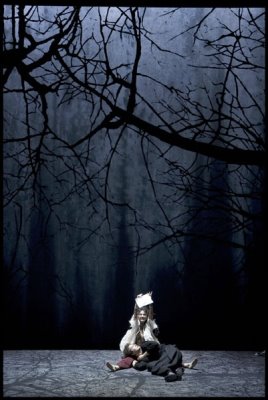 Benoît Mernier, Frühlings Erwachen, Théâtre royal de la monnaie, photo by Johan Jacobs |
The subject is eternal, speaking to the earthquake provoked in adolescents by the eruption of sexuality; the libretto by Jacques De Decker is at once personal and skillful, offering in a precise scheme of key scenes, a poetic crystallization ready for musical setting (although sometimes deliberately nebulous); the writing of Benoît Mernier, both orchestral and vocal, is sumptuous. Almost too much so, and that is our only paradoxical reservation.The production was reportedly excellent, as were the singing and the conducting. Here are a few more pictures.
In spite of a diamantine overture -- the crucial questioning of the "almost still a child" Wendla -- the first part drags, particularly the first act, cruelly deprived of dramatic tension in favor of an orchestra drunk on its own opulence (deployed again in the interludes), planing, variegated, infinitely open to a poetic and oneiric universe found in Mernier's style: it makes one think of An die Nacht, prophetic. One thinks also of Verdi, for whom the job of opera composer depended on his courage in cutting, "even in what is good": the third act offers an example, where one suddenly forgets the music to get lost in the opera as a whole, in its story, up to its shocking ending, strange, light, and open.
No comments:
Post a Comment